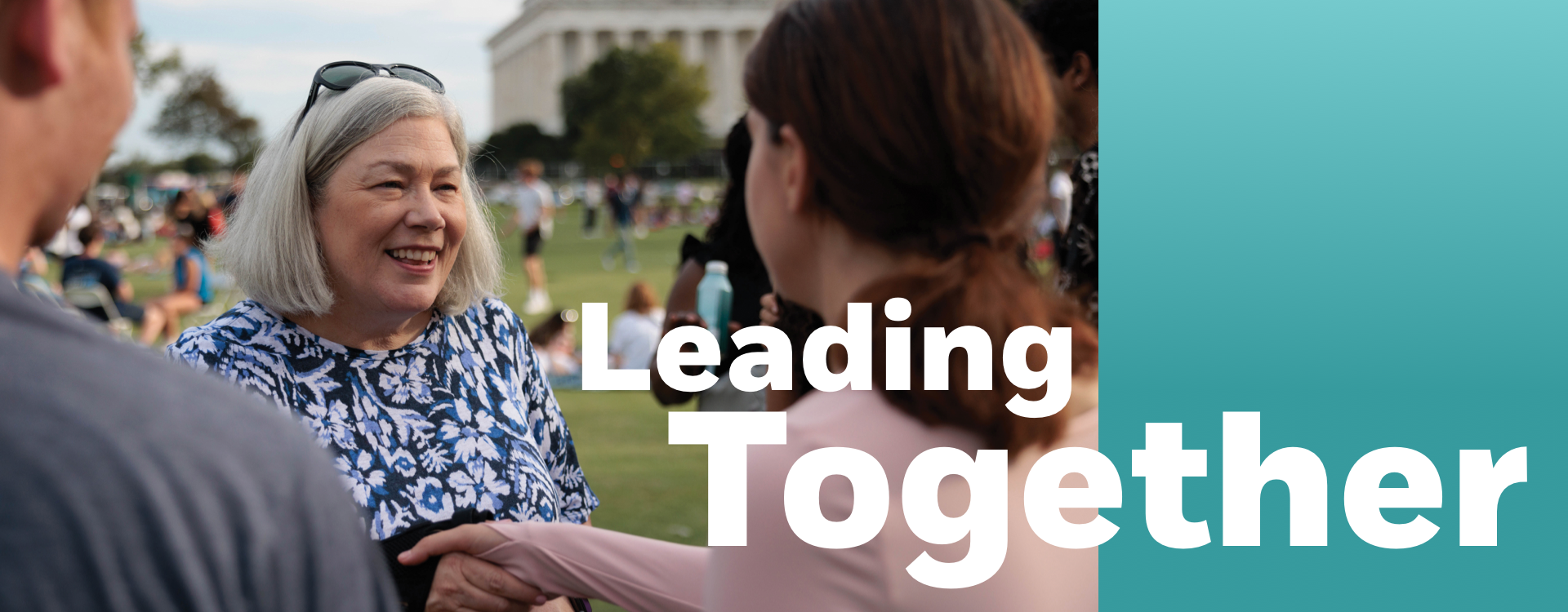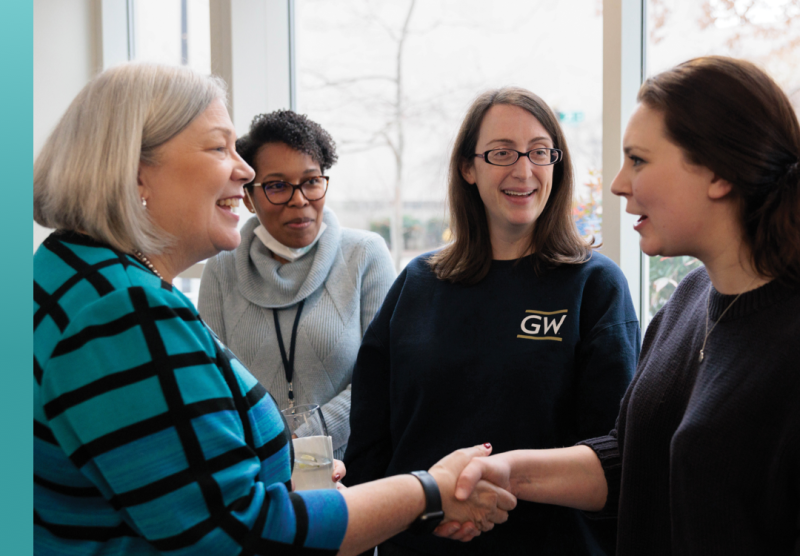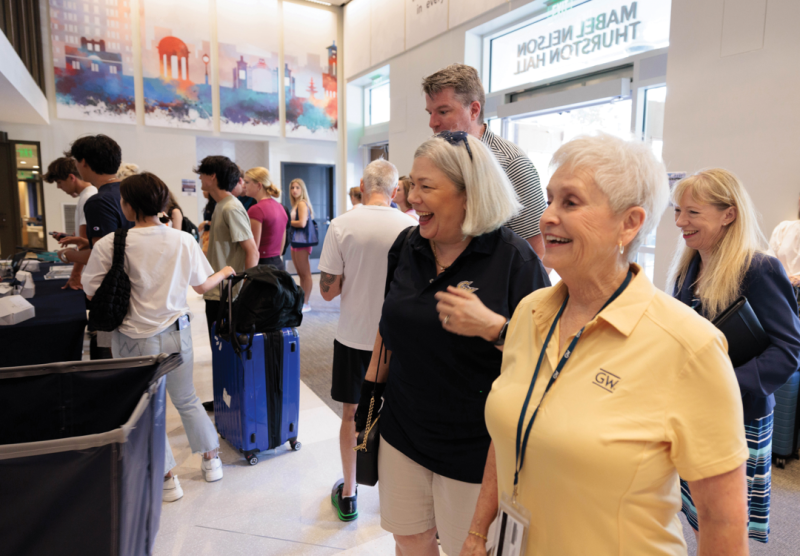Leading Together
In the midst of her first weeks on the job, Ellen M. Granberg, George Washington University’s 19th president, walked a half mile down 23rd Street from Foggy Bottom to a corner of the National Mall for a new student orientation event.
Story // John DiConsiglio
Overlooking the Lincoln Memorial, crowds of students kicked soccer balls, tossed cornhole bags and laid out on the grass under the hot August sun. Granberg’s plan was to walk up the east side of the field, chatting with students along the way, before turning back down the west side. She thought it would take about an hour.
She barely made it five feet. That’s when the first wave of students surrounded her and pleaded for a selfie. Within moments, more raced toward her—and snapped more selfies.
Every few steps, another student approached Granberg—a sophomore public health major who said meeting the university’s first woman president made her “happy”; a senior business major who’d shared a dessert with her at an earlier ice cream social; and incoming students who’d just arrived at GW from homes in France, China, Puerto Rico and Dubai. To each, Granberg introduced herself as “Ellen,” shared handshakes and hugs and, along with her wife, Sonya Rankin, posed for selfie after selfie after selfie.
Two hours later, Granberg had yet to make it up one side of the Mall when a pack of Taylor Swift super fans in concert T-shirts and tie-dye quizzed her on her favorite Tay tune. As the new president thumbed through her Spotify, the first-years debated whether she should download “Hits Different” or “Don’t Blame Me.”
“We adopted her as an honorary Swiftie,” laughs first-year finance student Daniel Litescu. “She is definitely not like any kind of university president I thought I’d meet.”
Genuine. Approachable. A listener. That’s how students described Granberg again and again—whether she was knocking on their residence hall doors as they unpacked on move-in day or dancing with the men’s basketball team at a pep rally. “I really feel like she cares about what I’m saying,” says junior public heath student Orlando Gonzalez.
And the raves weren’t confined to students. In her first weeks since coming to GW after serving as the provost and senior vice president for academic affairs at Rochester Institute of Technology (RIT), Granberg has met with faculty at Foggy Bottom, government officials on the Hill and alumni across the country. At each stop, she’s been “an absolute hit,” says GW Provost Christopher Alan Bracey. She has impressed the community with what Professor of English and presidential search committee member Gayle Wald calls her “empathetic and extraordinarily authentic personality.”
“She’s a rock star,” says junior fine arts major Sydney Clarke, who was studying at Science and Engineering Hall when Granberg strolled by and stopped for a chat. “You can tell when you speak with her—something special is happening here.”
Granberg talks with GW community members
Big Expectations, Bigger Goals
Granberg smiles at the compliments and explains that she’s sincerely interested in meeting people and hearing their stories. “GW is a big community. That can feel impersonal sometimes,” she says. “I want to create the feeling that we’re a small place within a big place.”
Still, Granberg is well aware that she faces big expectations. She inherits a university at an inflection point, succeeding Mark S. Wrighton, who had served as GW president on an interim basis since 2022. Wrighton was tasked with stabilizing the university as it emerged from the COVID-19 pandemic. Granberg’s role, Bracey notes, will be to chart an ambitious course for the future. “We’re looking to take off and accelerate into our third century,” he says.
According to voices across the GW community, Granberg is poised to be the right leader in the right place at the right time.
Bracey points to her extensive record of accomplishments—as an innovative business executive, a skilled sociologist, a dedicated educator and a strategic thinker who has guided institutions while strengthening infrastructures and supporting diverse cultures—as examples of why she is an ideal fit for leading a large university with numerous stakeholders.
“She brings energy and experience to developing strategic priorities for [GW] that reflect the future state of the university and the future state of the world that the university must be prepared to serve,” he says. “She’s able to communicate who she is as a president, what she aspires to do as a president and how she can bring us together and move the university forward.”
Maxwell Gocala-Nguyen, M.A. ’16, president of the GW Alumni Association, cites the excitement Granberg has already generated on campus and among alumni. He notes that her experience and communication skills make her uniquely prepared not only to connect with people across the university but also to engage in “tough conversations” over topics such as the recent moniker change, climate questions and political divides.
“She is very well-informed. She’s a very knowledgeable person. She has extensive history in leadership in higher ed,” he says. “She’s the right person to be at the helm of our very unique, prestigious institution.”
And staff members have embraced Granberg’s arrival, as well. During her first weeks in office, for example, she met with senior leadership at the Office for Diversity, Equity and Community Engagement and impressed them with her excitement about their work.
“She’s conversant about the topic, she’s eager to engage and she’s deeply curious about the needs of different constituents within our community,” says Caroline Laguerre-Brown, vice provost for diversity, equity and community engagement and a member of the presidential search committee.
Granberg has continued her connection with the office. During the annual Convocation and Welcome Day of Service, she “rolled up her sleeves,” Laguerre-Brown says, and joined students renovating a Northwest Washington elementary school. At a meeting of student citizen leaders, she quizzed young people on their summer volunteer activities. And at each stop, she acknowledged Laguerre-Brown’s staff for its hard work and commitment.
“She recognizes the contributions of people across the institution to make the institution strong,” Laguerre-Brown says. “That makes people feel validated. It lets them know they are seen.”
“She is definitely not like any kind of university president I thought I’d meet.”
Daniel Litescu
First-year finance student
Image: Granberg and Rankin lend a hand at Move In
Catalyst for the Possible
As she settles into her position, Granberg has set her sights on major goals—among them defending the value of higher education against critical headwinds; invigorating the alumni base and encouraging them to connect with students; and leveraging GW’s expertise and impact throughout D.C. and beyond.
Still, she emphasizes that her primary role is to bolster the efforts of the community around her. She describes herself as “a catalyst for what’s possible to ensure that our people have the resources, infrastructure and support they need to truly make a difference.”
Speaking to alumni, families and donors in Philadelphia during her “GW Together” national tour of university constituencies, she outlined several directions she’s prioritizing in the early phase of her presidency. They include making a GW education more affordable for everyone and enhancing the quality and depth of the student experience.
“We have opportunities to take advantage of our proximity in new and exciting ways, provide robust career-advising services that prepare students for the changing future of work, and enhance our athletics opportunities and experiences,” she says.
She also aims to build on the momentum from GW recently joining the nation’s top-tier research institutions in the Association of American Universities. And she pictures herself as a champion of the faculty—“the heart and soul of any university,” she says—as they push toward future breakthroughs.
“I feel there is a hunger here to be innovative, to bring our research infrastructure up another level, to really allow our faculty to do what they’re capable of doing,” she says. “I hope people will remember my administration as a time when we took some chances—and we made progress as a result.”
Indeed, Gayle Wald is confident that both faculty and students will view Granberg as an advocate for their research and a partner in promoting how the ideas they generate in labs, libraries and studios impact the world.
“Students and faculty are looking for someone who always keeps the educational mission of the university at the forefront,” Wald says. In Granberg, she believes they will see a president who “embodies their aspirations for GW and their sense of what leadership looks like in the 21st century.”
Meanwhile, as Granberg and Rankin continue to introduce themselves to the GW family—Granberg recently joined chef José Andrés, HON ’14, at a sustainability class to discuss global food solutions while Rankin rode a 7 a.m. bus with the gymnastics team for a practice in Chantilly, Va.—the couple hopes their energy and enthusiasm will be felt throughout the university.
“This is a community with a lot of hope, a lot of optimism and a lot of excitement,” Granberg says. “I want them to know that they are amazing. Part of my job is to hold up a mirror and remind people how good this place is and how good they are.”
Granberg with students at GW Welcome Day of Service
The Family Business
For Granberg, education has always been “the family business,” she says. Both her mother and stepfather were university professors in San Francisco, where Granberg grew up.
She still recalls her mother—her role model—speaking fondly about the Christmas gift her father bought her when she was 16: a slide rule. “That was like getting a MacBook in 1955,” Granberg laughs. It was a signal from Granberg’s grandfather, who was forced to drop out of college during the Depression, that he believed in his daughter’s potential—at a time when educating girls wasn’t always a priority. “She was a very strong person who would roll up her sleeves and get the work done,” Granberg says. “She wrote four books and raised six children.”
Granberg remembers being a shy, bookish child. She had aspirations to be a fashion designer—until she discovered she couldn’t draw. In the Watergate era, she considered following in the journalism footsteps of her heroes Bob Woodward and Carl Bernstein and even wrote for the school newspaper while earning her B.A. in history at the University of California, Davis.
Granberg then took an untraditional path to higher education—through the corporate world. After graduation, she joined the management training program at the Fortune 500 telecommunications firm Pacific Bell. She expected to spend a year or two in business before going to graduate school. But she stayed 11 years, energized by the high-octane environment as she led large-scale system conversions and honed her skills in decision making, team building and communication.
Granberg could have held on to her secure corporate career, but she was inevitably drawn back to the family business. She knew she was taking a risk when she left California for Nashville, Tenn., where she studied for her Ph.D. in sociology at Vanderbilt University. “But I asked myself,” she recalls, “when I look back in years to come, will I be more disappointed if I tried this and it didn’t work out or if I never tried at all?”
Academia offered Granberg a satisfaction she’d missed in the business world. As a sociology professor at Clemson University, she was enlivened by what she calls “the joy of discovery”—whether it was in the classroom where she helped students grasp difficult concepts or in the research arena where she led studies in self, identity and mental health issues.
At Clemson, Granberg initially became a “reluctant administrator,” as she put it, when her retiring department chair asked her to take over. She was hesitant to leave the classroom. But when she first helped an anthropology professor acquire a crucial piece of equipment for her research, she realized that she found fulfillment in advocating for her colleagues’ success.
Her leadership skills flourished as senior associate provost and associate provost for faculty affairs at Clemson and as provost at RIT. Her RIT colleagues praised her long list of achievements: bolstering teaching excellence across disciplines, including expanding doctoral programs; promoting a research infrastructure and investing in state-of-the-art facilities; supporting a diverse and inclusive community of students, faculty and staff; designing and implementing two major strategic plans; and collaborating with stakeholders to drive change and increase institutional prominence.
“Ellen is a brilliant and strategic thinker, an accomplished planner and a committed doer,” says RIT President David Munson. “Her collaborative and engaging personal style will serve her especially well as she leads GW.”
Granberg’s return to academia altered more than just her professional life. While at Vanderbilt, she met Rankin by chance at a mutual friend’s party. The pair had such different temperaments, Rankin says, that none of their friends ever considered matching them up. A sales executive and the first in her Memphis family to go to college, Rankin describes herself as “proactive” as opposed to the “even keel” Granberg. When they first went to a sporting event together, Rankin, a die-hard football fan, cheered loudly—while Granberg brought a book.
But the couple, who will celebrate 25 years together in November, also share common passions—including sports, which, Rankin says, Granberg has embraced over time. “She’s put the book aside and now she studies games like a statistician,” she says. Both have enjoyed meeting GW athletes, and Granberg praises “a healthy athletics program” as an important component of a thriving university. The pair are also strong boosters of theater and the arts. And while they don’t always agree, they credit their differences with complementing each other and strengthening their relationship.
“I have learned so much from Sonya over the years,” Granberg says. “We encourage each other, we support each other and we both have a sense of adventure.”
In fact, when Granberg first broached the idea of coming to GW, it was Sonya—“the analyzer,” Granberg says—who spent a day online researching the university and D.C. before giving an enthusiastic thumbs-up to the move. “It didn’t take long to figure out that this was a place where we could be happy,” Rankin says. After living together or apart across the country—California to Atlanta, upstate New York to Tennessee—“I knew this could be a home for us.”
“I am someone who believes that leadership is not just about me—it’s about the community.”
-President Granberg
‘I can’t do it alone’
Even before settling in Foggy Bottom, Granberg knew the strengths of the institution she was about to lead: a storied history in the heart of the nation’s capital; a comprehensive university where her experience advocating for STEM and engineering disciplines complements robust scholarship in the arts, medicine, law and international affairs; a dedicated and active alumni base around the globe.
But within days of arriving on campus, Granberg says she quickly saw what truly makes GW special: its people. She’s on a mission to meet them all, she insists—from faculty who have been eager to discuss their research to staff who stop her and Rankin on their daily walks and wish them good luck to the talented students who “come to GW to change the world.” Already, she jokes, she’s learned to leave extra time on her way to appointments for selfies.
“I am someone who believes that leadership is not just about me—it’s about the community,” she says.
It’s a message that Bracey expects to resonate with the university as more people get to know her.
“Our faculty, our students and our staff crave authentic leadership,” he says. “She has the ability to bring people together.”
For their part, Granberg and Rankin say they’ve been warmly welcomed into the GW family. Several students have told Rankin that they cried when they learned the university would have its first female president. One mother hugged her at a sporting event and said she was proud to send her daughter to GW.
“I want the GW community to know how excited we are about being here,” Granberg says. “I want to do a great job for GW—and I know I can’t do it alone. I want people to look back and be glad that I was here. I want them to feel good about what we did—together.”
Photos // William Atkins






